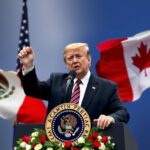Trump Imposes New Tariffs on Mexico, Canada, and China
President Trump introduced new tariffs on Mexico and Canada (25%) and China (10%) aimed at curbing fentanyl distribution. This move constitutes a reversal of free trade agreements and raises concerns about consumer costs and economic disruptions. Trump reiterated his long-standing support for tariffs as a means to strengthen US economic position globally.
On Saturday, President Donald Trump signed new tariffs targeting Mexico, Canada, and China at his Mar-a-Lago estate. This action marks a departure from the previously established duty-free trade among these nations. White House press secretary Karoline Leavitt indicated that the tariffs would impose a 25% duty on imports from Mexico and Canada and a 10% tariff on goods from China, primarily aimed at addressing the illegal fentanyl crisis linked to these countries.
Tariffs are a vital aspect of international trade policy and have historically been employed as tools for economic negotiation. President Trump has consistently endorsed tariffs throughout his political career, linking them to the protection of American workers and industries. The recent announcements signify an attempt to leverage trade policies to confront issues such as drug trafficking, particularly the influx of fentanyl, which has severe implications for public health.
In summary, President Trump’s announcement of new tariffs represents a significant shift in trade relations with Mexico, Canada, and China, potentially leading to broader economic repercussions. While the administration posits that these tariffs will benefit the United States economically, there is concern regarding the short-term disruptions they may create for consumers and the supply chain. The administration’s focus remains on ensuring fair trade practices and addressing critical issues like the fentanyl crisis.
Original Source: www.cnn.com








Post Comment